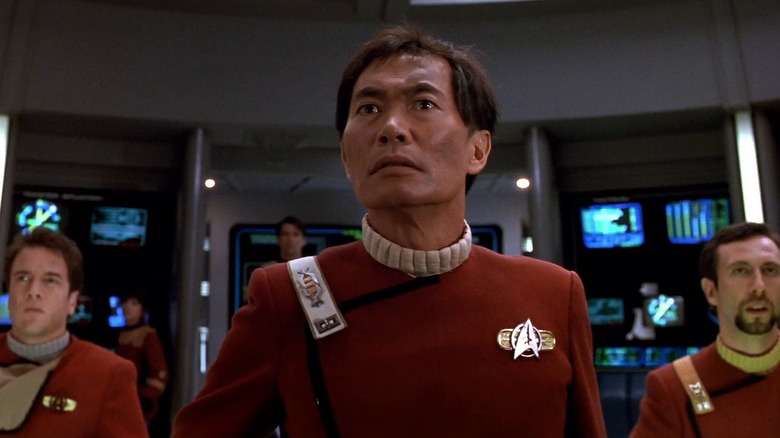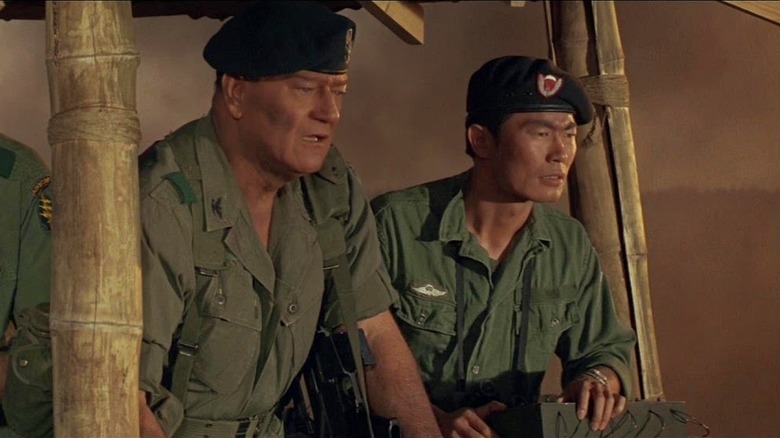George Takei's Star Trek Legacy Was Almost Ruined By A John Wayne Movie
Prior to landing the gig playing helmsman Hikaru Sulu on "Star Trek," actor George Takei landed a few dubbing jobs that led to him providing the English-language voices for Japanese films like "Rodan" and "Godzilla Raids Again." His first credited on-scree film role was for the 1958 adventure flick "Ice Palace" with Richard Burton. Throughout the early 1960s, he continued to play small roles in large Hollywood film productions, although his career began to thrive on television, with Takei landing guest spots on some of the hottest shows of the day. Indeed, he wound up being on episodes of "Perry Mason," "The Twilight Zone," "My Three Sons," "Death Valley Days," and "I Spy."
"Star Trek" was a three-year supporting gig for Takei, and it initially wasn't a hugely successful show, ending in 1969. After that, Takei merely turned back to other one-shot appearances on shows like "The Courtship of Eddie's Father" and "Ironside." Thanks to reruns, however, "Star Trek" lingered in the pop consciousness well into the 1970s, and Sulu soon emerged as Takei's best-known role. By the middle of the decade, "Star Trek" conventions began to become a pop phenomenon, with Takei making live appearances to talk about Sulu. He continued to be involved with the franchise in the decades that followed, even playing Sulu on an episode of "Star Trek: Lower Decks."
But before all that, Takei was also closely associated with a poorly-received John Wayne military thriller that hit theaters in the middle of his stint on "Star Trek." The 1968 war picture "The Green Berets," which was co-directed by John Wayne and Roy Kellogg and backed by the U.S. government, featured Takei as a Vietnamese interrogator named Captain Nghiem. "The Green Berets" was a high-profile production, costing a then-substantial $7 million to make and boasting an "old guys still got it" performance from Wayne. It was also quite notorious for trying to apply the rah-rah patriotism of a 1940s WWII flick to the bleakness of the Vietnam War. This, in turn, almost caused a major problem for Takei and his legacy.
The Green Berets nearly eclipsed Star Trek
Recall that "Star Trek" required a letter-writing campaign just to stay on the air for a third season. It had a passionate following of science enthusiasts and utopia nerds from the very start, but the ratings remained middling to low. As a result, far more people saw "The Green Berets" when it first came out than "Star Trek," making it Takei's most visible gig at that point. Indeed, Takei had to step away from several episodes of "Star Trek" so he could film "The Green Berets."
Also recall, however, that "The Green Berets" got terrible reviews and is still, to this day, considered one of Wayne's worst movies (at least according to the users on Letterboxd). Roger Ebert even went so far as to give the film zero stars.
Takei once spoke with the Valley Tribune (as transcribed by MeTV), and he expressed a note of ambivalence toward his involvement in the John Wayne film, mostly because it was keeping him from his regular job on "Star Trek." As he put it:
"I have mixed feelings about 'Green Berets.' We had a break during 'Star Trek,' and this offer came, so I thought 'Great! I'll go out and do "Green Berets."' [...] It was going alright until we got some bad weather, then it got delayed. I think it was like a two-month schedule, and it became something like three-and-a-half months. It was critical that this picture be on schedule, for me to be able to get back to Hollywood before the shooting for the new season started for 'Star Trek.' But because of the delay, I missed out on the whole second season of 'Star Trek.' So I have my regrets about that."
Takei mentioned elsewhere that a lot of "The Green Berets" was improvised because of shooting delays, but also that Wayne was friendly enough to him. All the same, it's a good thing "The Green Berets" faded from the public consciousness rapidly, providing room for Takei's "Star Trek" reputation to grow. It was certainly the best scenario for the actor.

